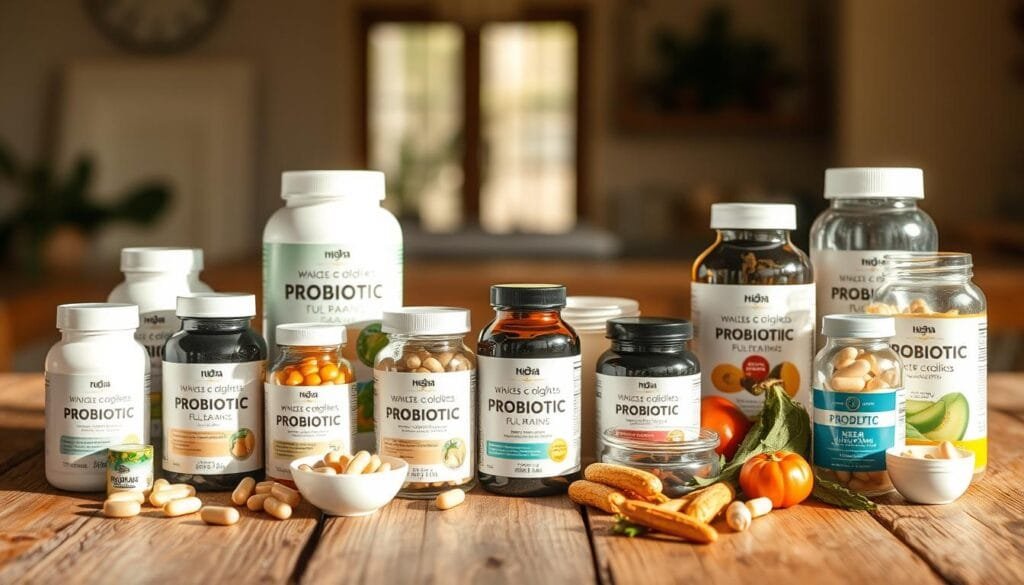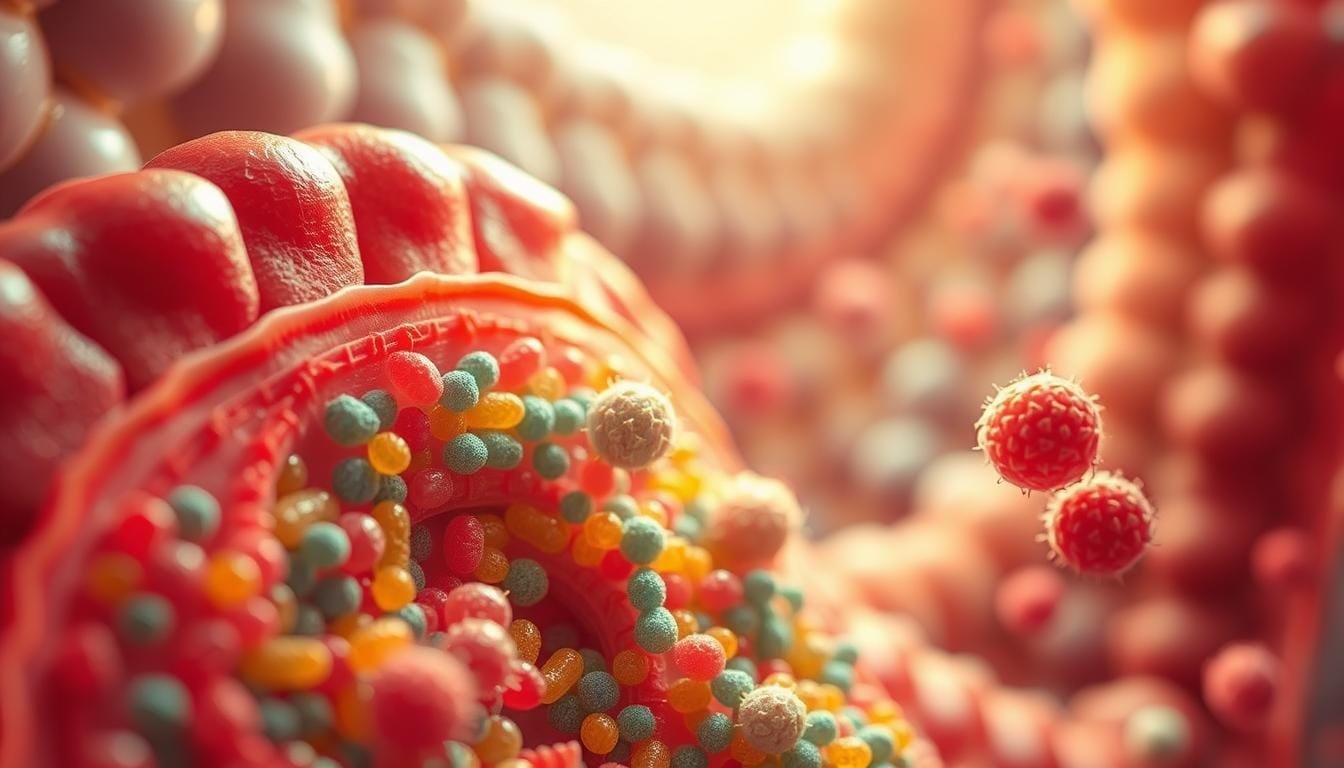Currently Empty: RM0.00
The digestive system’s inner wall acts as a protective barrier, filtering nutrients while blocking harmful substances. When this barrier weakens—a condition called increased intestinal permeability—toxins and bacteria can enter the bloodstream. This triggers inflammation, fatigue, and other issues that disrupt daily life.
Modern diets, stress, and environmental factors often contribute to this imbalance. Research shows that restoring balance requires more than temporary fixes. Targeted probiotic interventions, like those highlighted in our guide to the best probiotics for anti-aging benefits, can strengthen the digestive ecosystem naturally.
Wellness Concept’s experts emphasize personalized approaches for lasting results. Their team combines scientific knowledge with practical strategies to address individual needs. For tailored advice, contact them via WhatsApp at +60123822655.
Key Takeaways
- Leaky gut occurs when the intestinal barrier becomes porous, allowing toxins into the bloodstream.
- Probiotics play a critical role in rebuilding microbial balance and barrier strength.
- Expert-guided plans ensure interventions align with personal health goals.
- A healthy digestive system supports immunity, energy, and overall wellness.
- Professional support from Wellness Concept simplifies the path to sustainable healing.
Introduction to Gut Health & the Power of Probiotics
The digestive system’s microbial community houses over 200 species of bacteria, viruses, and fungi working together to keep the body balanced and healthy. Research shows diverse bacterial communities may lower risks for diabetes, inflammatory conditions, and immune disorders. This complex ecosystem doesn’t just handle digestion—it influences everything from skin clarity to mental sharpness.
What is Gut Health?
Gut health refers to the optimal functioning of the microbiome, a dynamic network supporting nutrient absorption and immune defense. These microorganisms produce vitamins like B12 and vitamin K while neutralizing harmful pathogens. A thriving microbiome also communicates with the brain via neurotransmitters, influencing mood and cognitive performance.
Benefits of Incorporating Probiotics
Probiotics introduce live beneficial bacteria that restore microbial diversity disrupted by stress or poor diet. Regular intake can reduce bloating, boost immunity, and enhance metabolic efficiency. Studies highlight their role in strengthening intestinal barriers, which prevents toxins from leaking into the bloodstream. Pairing them with fiber-rich foods creates a symbiotic relationship for sustained digestive wellness.
Understanding Leaky Gut Syndrome
A compromised intestinal barrier often goes unnoticed until health issues arise. This condition, formally called increased intestinal permeability, allows undigested food particles and toxins to enter the bloodstream. Over time, this triggers inflammation and disrupts essential bodily functions.
Causes and Warning Signs
Four primary factors weaken the intestinal barrier: processed foods high in sugar, chronic stress, environmental pollutants, and microbial imbalances. These elements erode tight junctions between cells—gatekeepers that normally control nutrient absorption.
Early symptoms often mimic common digestive complaints. Bloating, irregular bowel movements, and food sensitivities may signal trouble. As permeability worsens, fatigue, skin rashes, and joint discomfort frequently appear. Left unaddressed, these issues can evolve into autoimmune responses or chronic inflammation.
Scientific Insights on Intestinal Permeability
Studies reveal that zonulin, a protein regulating tight junctions, plays a key role. Elevated zonulin levels directly correlate with barrier dysfunction. Testing methods like lactulose-mannitol assays now measure permeability levels clinically.
Research also links intestinal bacterial overgrowth to persistent inflammation. Harmful microbes produce toxins that further damage cell walls, creating a cycle of deterioration.
How Leaky Gut Impacts Overall Health
When the barrier fails, the immune system becomes overactive. It attacks harmless substances, increasing allergy risks. Nutrient malabsorption leads to deficiencies, while circulating toxins strain liver function.
Conditions like eczema, IBS, and rheumatoid arthritis show strong connections to permeability issues. Mental health challenges, including anxiety and brain fog, may also stem from this systemic imbalance.
Repair your gut lining with probiotic
Beneficial microbes act like construction workers in the digestive tract, patching weak spots in the intestinal barrier. Specific strains such as Lactobacillus rhamnosus and Bifidobacterium longum tighten cellular junctions, reducing permeability. This process prevents toxins from triggering inflammation while promoting tissue regeneration.
Clinical studies highlight how these microorganisms crowd out harmful bacteria, restoring balance. Multi-strain formulas show superior results compared to single-species supplements. A 2023 review in Gut Microbes found that combining strains increased tight junction protein production by 42%.
“Probiotic therapy demonstrates measurable improvements in intestinal barrier function within 8–12 weeks.”
Healing timelines vary based on diet, stress levels, and initial gut damage severity. Pairing probiotics with anti-inflammatory foods accelerates recovery. Regular monitoring helps adjust strains to match evolving needs.
Key mechanisms include:
- Boosting mucus production to shield intestinal walls
- Neutralizing toxins from pathogenic bacteria
- Activating immune cells that repair damaged tissue
This collaborative approach ensures the body’s natural healing processes work efficiently. Over time, a resilient barrier forms, reducing risks of recurrent issues.
Selecting the Right Probiotics and Supplements
Choosing microbial allies requires precision. Not all probiotics work equally for intestinal repair, and pairing them with targeted supplements amplifies results. Science-backed combinations create a robust environment for lasting digestive wellness.

Effective Strains for Gut Repair
Specific bacterial strains outperform others in restoring barrier integrity. Research highlights four powerhouses:
| Strain | Key Benefit | Clinical Support |
|---|---|---|
| Lactobacillus rhamnosus GG | Reduces permeability | 23 human trials |
| Bifidobacterium lactis | Boosts mucus production | 2022 meta-analysis |
| Saccharomyces boulardii | Neutralizes toxins | 8 randomized studies |
Multi-strain formulas show 30% better results than single-species products. Look for supplements containing 10–50 billion CFUs with delayed-release capsules.
Choosing Complementary Supplements
Three additions enhance probiotic effectiveness:
- L-glutamine: Fuels intestinal cell regeneration
- Vitamin D: Strengthens tight junction proteins
- DGL licorice: Soothes inflamed tissue
Studies suggest combining these with probiotics accelerates healing by 40%. Always verify supplement purity through third-party testing.
Integrating Probiotics into Your Daily Diet
Building a resilient digestive ecosystem starts with smart food choices. Natural, nutrient-dense options work alongside supplements to create lasting balance. Let’s explore practical strategies to nourish your microbial allies through everyday meals.
Probiotic-Rich Foods to Consider
Fermented staples deliver live cultures that populate the digestive tract. Yogurt with active cultures, tangy kefir, and crunchy sauerkraut offer diverse bacterial strains. Kimchi and kombucha add flavorful variety while supporting microbial diversity.
The Role of Prebiotics
These fibrous compounds act as fertilizer for beneficial bacteria. Garlic, onions, and asparagus contain inulin—a premium fuel source. Bananas and whole grains provide resistant starch that feeds microbial communities overnight.
| Food Type | Examples | Key Nutrients |
|---|---|---|
| Probiotic | Yogurt, Kimchi | Live cultures, Vitamin K |
| Prebiotic | Garlic, Bananas | Inulin, Resistant starch |
| Synbiotic | Kefir + Berries | Combined bacteria & fuel |
Creative Ways to Enhance Your Diet
Try mixing fermented veggies into salads or blending kefir into smoothies. Add garlic-roasted asparagus as a side dish to protein-rich meals. For busy people, prep overnight oats with yogurt and bananas—a gut-friendly breakfast ready at dawn.
Start with small servings to let your system adjust. Check labels for phrases like “live active cultures” and avoid products with added sugars. Combining these foods creates meals that taste great while healing from within.
Lifestyle Adjustments and Additional Gut Support
Daily habits shape more than just routines—they directly influence internal healing processes. Small, consistent changes amplify probiotic benefits while creating an environment where the digestive system thrives.

Effects of Stress, Sleep, and Exercise
Chronic stress floods the body with cortisol, a hormone that weakens intestinal cell connections. Simple practices like deep breathing or 10-minute walks lower stress hormones by 28%, studies show. Prioritizing these activities protects barrier function.
Sleep quality matters just as much as quantity. Poor rest disrupts microbial balance and increases inflammation markers. Aim for 7–8 hours nightly, and avoid screens 90 minutes before bed to support recovery.
Exercise boosts circulation but requires moderation. While yoga enhances digestion, prolonged high-intensity sessions may strain the intestinal barrier. Balance cardio with restorative movements like tai chi.
Anti-inflammatory Diet Tips
Food choices either fuel healing or feed inflammation. Focus on whole foods rich in omega-3s like salmon and walnuts. These nutrients reduce swelling while supporting cellular repair.
| Include | Avoid |
|---|---|
| Leafy greens | Processed snacks |
| Turmeric | Refined sugars |
| Berries | Artificial additives |
Hydration and meal timing also play roles. Drink water between meals to aid toxin removal. Eating within a 12-hour window gives the digestive system essential rest periods.
Expert Tips from Wellness Concept
Navigating digestive wellness becomes simpler with expert guidance. Wellness Concept’s team combines clinical research with practical strategies to help people achieve lasting results. Their approach focuses on creating tailored plans that address individual needs rather than offering generic solutions.
Personalized probiotic plans consider factors like medical history, dietary habits, and lifestyle. This customization ensures interventions work harmoniously with the body’s natural rhythms. Regular check-ins allow adjustments based on progress and emerging research.
Connect via WhatsApp: +60123822655
Professional support is just a message away. Reach Wellness Concept’s specialists Monday-Friday (9:30 am-6:30 pm) or weekends (10 am-5 pm). Quick responses help clarify doubts about supplement timing, dosage, or unexpected reactions.
“Many studies found that structured probiotic protocols improve gut function 37% faster than self-guided approaches.”
Three key advantages of expert guidance:
- Access to clinically tested strain combinations
- Diet and lifestyle recommendations synced with probiotic use
- Early detection of adjustment needs through symptom tracking
This partnership model transforms guesswork into strategic healing. Whether optimizing existing routines or starting fresh, professional insights help people reclaim their health efficiently.
The Impact of Gut Health on Overall Well-being
The intricate network within our digestive tract holds surprising influence over nearly every bodily function. From mental clarity to disease resistance, its role extends far beyond breaking down meals. Emerging research reveals how this internal ecosystem shapes lifelong wellness.
Mental and Immune System Benefits
A balanced microbiome produces neurotransmitters like serotonin, directly affecting mood and stress response. Studies link diverse gut bacteria to 40% lower anxiety rates. Simultaneously, 70% of immune cells reside in the digestive system, relying on microbial signals to fight infections effectively.
Long-Term Health and Lifestyle Studies
Decades of data show consistent patterns. People with robust gut health face fewer autoimmune flare-ups and heart issues. One 2023 study found a 32% reduced cancer risk among those maintaining microbial diversity through diet and lifestyle. Regular exercise and stress management further amplify these protective effects.
Prioritizing this biological hub doesn’t just ease bloating—it builds resilience against modern health challenges. Simple daily choices create ripple effects, safeguarding both mind and body for years to come.
FAQ
How do probiotics support digestive health?
Probiotics help balance the microbiome by introducing beneficial bacteria. Strains like Lactobacillus and Bifidobacterium strengthen the intestinal barrier, reduce inflammation, and improve nutrient absorption. Studies show they may also ease issues like bloating or irregular bowel movements.
What foods naturally boost gut bacteria?
Fermented options like kimchi, kefir, and sauerkraut are rich in live cultures. Prebiotic foods such as garlic, onions, and bananas feed good bacteria. Including fiber-rich meals with oats or apples can further enhance microbial diversity.
Can stress worsen intestinal permeability?
Chronic stress triggers inflammation, which weakens tight junctions in the gut lining. This may increase permeability, allowing toxins into the bloodstream. Practices like meditation or yoga, paired with probiotics, help mitigate these effects.
Are supplements necessary for healing leaky gut?
While diet is key, supplements like L-glutamine, zinc carnosine, or collagen peptides can accelerate repair. Brands like Pure Encapsulations or Garden of Life offer targeted formulas. Always consult a healthcare provider before starting new regimens.
How does gut health influence mental well-being?
The gut-brain axis links digestive function to mood regulation. Research ties balanced microbiomes to lower anxiety and depression risk. Probiotics like B. longum may even improve serotonin production for a calmer mind.
What lifestyle changes complement probiotic use?
Prioritize sleep (7–9 hours nightly), moderate exercise, and anti-inflammatory diets rich in omega-3s. Reducing processed sugars and alcohol intake also supports microbial balance. Wellness Concept’s experts recommend gradual shifts for sustainable results.
Can children or pregnant women take probiotics?
Certain strains are safe, but dosage matters. Products like Culturelle Kids or Renew Life’s prenatal blends are tailored for specific needs. Always check with a pediatrician or obstetrician to ensure compatibility.



